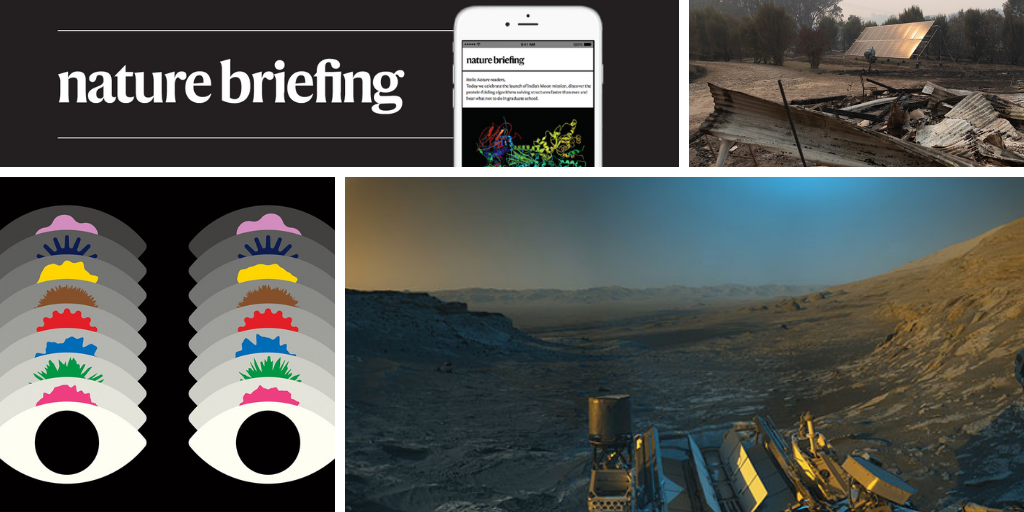NATURE BRIEFING 07 December 2021 Sign up for Nature Briefing
Hello Nature readers, would you like to get this Briefing in your inbox free every day? Sign up here. Credit: NASA/JPL-Caltech
The month’s best science imagesNASA’s Curiosity rover used its navigation cameras to capture this panoramic view of Mars’s surface at different times of day. Engineers combined photos from the morning and afternoon on Mars. They then added colours in an artistic re-creation that includes images from the morning scene in blue, the afternoon scene in orange and a combination of both in green.See more of the month’s sharpest science shots, selected by Nature’s photo team.Nature | Leisurely scrolln-dimensional image tool powers up PythonA free, open-source and extensible image viewer for arbitrarily complex (‘n-dimensional’) data fills a gap in the Python scientific ecosystem. napari — whose name refers to a Pacific island village midway between the developers’ bases in San Francisco and Melbourne — features a simple graphical interface with a built-in Python console. Early adopters are using it to streamline everything from visualizing atmospheric jet streams to identifying cells in tissue.Nature | 4 min read How SARS-CoV-2 evolves over the next several months and years will determine whether the virus morphs into another common cold — or something more threatening, such as influenza or worse. Scientists are searching for ways to predict the virus’s next moves by looking to other pathogens for clues. They are tracking the effects of the mutations in the variants that have arisen so far, such as Delta and Omicron. And they are warning that letting SARS-CoV-2 spread gives it more opportunities to make significant evolutionary leaps. Nature | 9 min read Inside the first oral COVID antivirals Two new antiviral pills to treat COVID-19 — molnupiravir, developed by Merck and Ridgeback Biotherapeutics, and Pfizer’s paxlovid — were developed in record time. Pfizer’s innovative treatment inhibits an enzyme known as the main protease (Mpro), which is integral to coronavirus replication. ‘It’s kind of the Achilles heel of the virus,’ says antiviral researcher Rolf Hilgenfeld. Merck and Ridgeback focused on the viral RNA-dependent RNA polymerase (RdRp), which is also targeted by Gilead’s approved drug remdesivir. RdRp is a viral enzyme that synthesizes RNA — both for translation into viral proteins and for generating copies of itself. Nature Reviews Drug Discovery | 10 min read Read more: COVID antiviral pills: what scientists still want to know (Nature | 8 min read) Features & opinionBuild solar-energy systems to lastSolar energy is being adopted the world over — but the technologies being installed today might not last, warn four solar-energy scientists and engineers. Today’s sophisticated systems have little room for error, and they face increasingly extreme weather whipped up by climate change. The authors lay out a plan — including quality control, standards and testing — that could save billions of dollars and assure decades of affordable clean electricity to come.Nature | 7 min read DNA sleuths send Pearl Harbor boys homeThe remains of hundreds of sailors who died at Pearl Harbor 80 years ago have been returned to their communities thanks to a groundbreaking scientific effort. The unidentified bodies of almost 400 men who perished inside the USS Oklahoma had been interred in mass graves in Hawaii. Identifying them was fiendishly difficult: most were about the same age and height, and many came from similar genetic backgrounds, often sharing mitochondrial DNA from distant maternal ancestors. There were also six sets of siblings and a set of twins. Yet scientists were able to identify over 90% of the men — in one case, returning the remains of three brothers to their only surviving brother.Politico | 13 min readInfographic of the week Sources: Intakes, Ref. 4; Costs, Ref. 12
As the world population continues to rise, researchers are grappling with the question of what we should eat to stay healthy and save the planet. A 2019 report from a consortium of nutritionists, ecologists and other experts recommended that people adopt a ‘flexitarian’ diet by eating plants on most days and occasionally a small amount of meat or fish. The commission estimates that this diet would save the lives of about 11 million people every year, but others question whether it is practical, affordable and nutritious enough. Scientists are now trying to test environmentally sustainable diets in local contexts, without compromising nutrition or damaging livelihoods. (Nature | 11 min read)See more of the week’s key infographics, selected by Nature’s news and art teams. Labour protections and antitrust measures are the most effective way to create a layer of checks and balances on the ‘whim-driven decisions’ of tech billionaires, argues artificial intelligence (AI) researcher Timnit Gebru, the former co-lead of Google’s Ethical AI team. (The Guardian | 5 min read) doi: https://doi.org/10.1038/d41586-021-03670-5Dare you heed the call to generate an AI artwork based on the title of your thesis? Warning! Some are quite lovely. Some are nightmare fuel.Help me to generate a daily newsletter based on your wants and needs. Your feedback is always welcome at briefing@nature.com.Flora Graham, senior editor, Nature Briefing
https://www.nature.com/articles/d41586-021-03670-5
